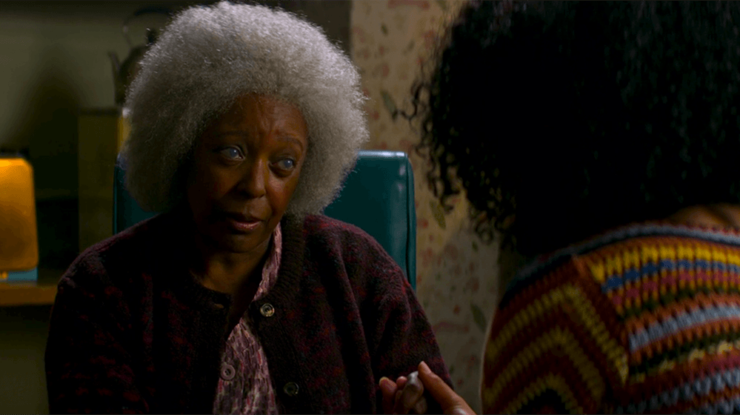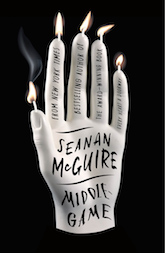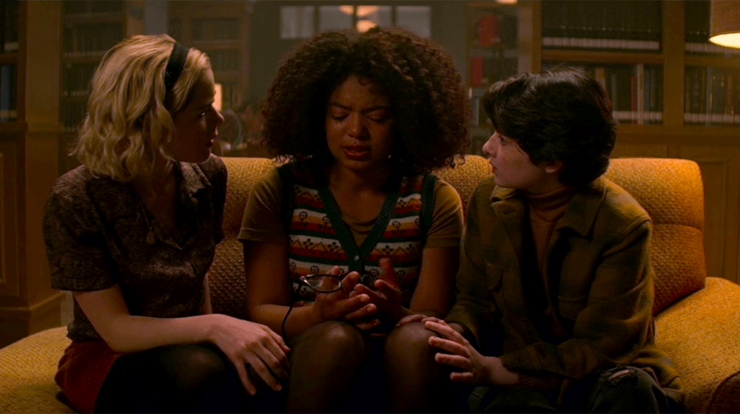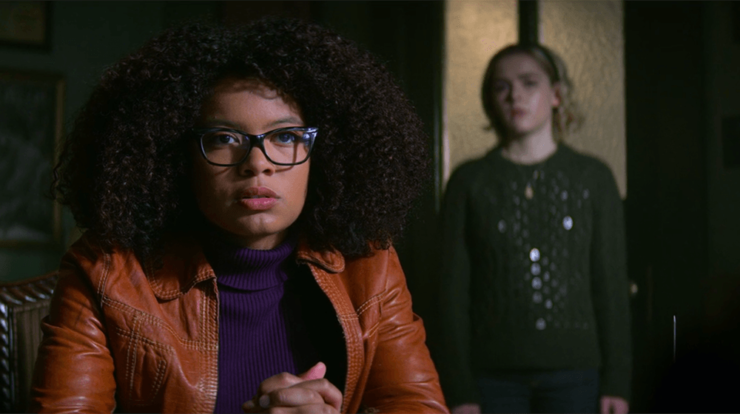“I just can’t imagine what it would be like to be… like you.” This statement is often accompanied by a gesture, usually to my face, sometimes to my cane. They are referencing my blindness, my cataract, my hearing aids.
They can’t imagine what it would be like to live with one eye, with limited vision, with no vision at all.
It isn’t that they have no imagination, but rather, it’s because the stories we’ve been told about what it’s like to be blind are so filled with fear and falsehoods, that I empathize. It would be impossible to imagine a life within the darkness, or even within the partial light, without fear.
As a blind consumer of media, I often find myself frustrated by these depictions of blindness, which give people little hope in a world full of it.
So we’re going to talk about it. This essay serves as the beginning of Constructing Blindness, a monthly series which will delve into how abled people are shown what blindness looks like, and what the reality of blindness is off the page, stage, or screen. The first new piece of media we’ll tackle is The Chilling Adventures of Sabrina. Because here, we can talk not just about how blindness is depicted, but also about how blind people access media.
I don’t want to be the killjoy—I never want to be killjoy—but lots of people have talked about the problems that lie within Sabrina’s plot and storytelling, and this is just one more problem to add to the list. Roz comes from a long line of women endowed with “The Cunning,” a psychic sight, which in addition to giving you said powers, also renders you blind. It’s said to be part of a curse that was handed down by a witch in Greendale’s past.
In other words, it’s a blindness punishment which happens to come with a powerful perk.
This isn’t really an essay about blindness as punishment, because of course, the punishment isn’t over something Roz did. Roz is an innocent, aside from her bloodline linking her to those who did something which required recompense. What I have a problem with is that when Roz realizes that she is finally beginning to go blind—something which her family has known about for years, which she has known would happen to her—she cries about the fact that she won’t be able to read all the books she’s ever wanted to.
Because she’s going blind.
(Insert Blank Stare Gif Here)

Do you want to tell me how many books I read in a week? How many stories I devour? Let me tell you about some of my friends, notorious book lovers, who are blinder than I am.
Some blind people learn how to read braille, and use their fingers to access stories.
Others become rabid fans of the audiobook.
I know folks who use DAISY, or who get access to large print and audiobooks through programs specifically designed for the purpose of giving blind people access to stories.
Those of us with enough eyesight use Kindles and other e-readers, bumping the font up to “can be read over our shoulders” levels.
In other words: Just because someone is blind doesn’t mean they can’t read, and it certainly doesn’t mean that they have been excommunicated from the land of story, chapter and verse.
Buy the Book


Middlegame
But with this simple line from Roz about losing the world of books, the show reveals a larger problem with their story.
Because if Roz’ grandmother is blind, if the women of her family go blind as a part of this curse… why aren’t they well versed in the language of blindness, and in the adaptive aids which make living with it possible?
Why didn’t I see a single white cane in the background? How come there wasn’t a guide dog snoring on the floor next to her blind grandma?
Setting aside my problems with the whole trope of the blind psychic, this just doesn’t depict a kind or supportive family. A family that cares about the emotional health of the blind people in their midst. There are no visual cues that tell me the family knows how to manage blindness, and Roz’ terror tells me that she has no concept of the future that awaits her.
Will she bring a guide dog to Greendale High? Or would she use a white cane?
It’s important to acknowledge that it is scary to lose vision when you don’t know how to cope. Of course it would be frightening to Roz—but what bothers me is that her family treats it like it should be frightening, rather than giving her the adaptive tools to lead a life she’d be happy with. In a family that knows what blindness is like, a holistic approach that would give Roz safety and security seems like something I would expect—and something I’d love to see depicted on screen. A family that copes through knowledge and adaptability; a family (like the one in A Quiet Place) that understands and utilizes interdependence to create access.
As someone who lives with the knowledge that my sight may get worse, I’ve made choices that will hopefully make my life easier in the future. Getting a guide dog (at the time this publishes I will literally be at guide dog school), learning braille, learning how to use a white cane. I have availed myself of skillset training and knowledge to find my place in a sighted world. It isn’t always fun, but it is manageable.
It shouldn’t be a source of indescribable terror.

This is the problem that I had with The Chilling Adventures. Like every other story that features blindness as a subplot, it makes no plans for its blind characters to live their lives, to independently pursue hobbies. It offers no assurances that being blind isn’t going to render you a member of the deserted island of the blind. It doesn’t tell the viewer that Roz will be okay, because the ultimate sacrifice here is that she will lose her vision—and as a bonus, she will lose the things she loves along with it.
We have to do better by blind readers and consumers of media. We have to tell stories that don’t shove blind people into assumed isolation. Because that’s not how we live our lives.
I ski, I ice skate, I ride horses.
I read and write books.
I have blind friends who fence and skydive, who’ve worked in the U.S. Government, who teach, who are moms and dads.
Roz has a beautiful future ahead of her. More stories to read, more books to consume.
Roz has a beautiful future—but only if her creators allow her to grasp it.
Her future certainly contains people telling her that they can’t imagine living the life that she lives. Her future also could contain a guide dog, or a white cane. Roz could do anything she wanted—but only if the narrow, outdated conceptions of blindness change in the world that she inhabits.
Elsa Sjunneson-Henry is a gimlet made from feminism and snark. She’s a deafblind speculative fiction author, and she writes disability focused nonfiction as well. Her work has appeared in Uncanny, Fireside, Tor.com, CNN and The Boston Globe. She writes from a dragon lair in NJ, and can be found on the web @snarkbat and snarkbat.com










